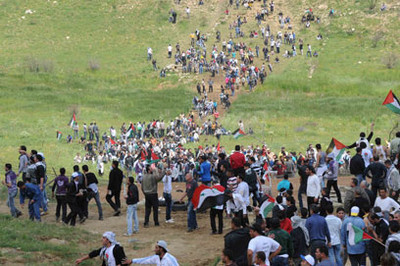by Daniel Pipes
May 15, 2011
updated May 23, 2011
I predicted a few weeks ago that Arab upheavals might inspire Palestinians to shift “away from warfare and terrorism in favor of non-violent political action. That could include massive non-violent demonstrations such as marching on Israeli towns, borders, and checkpoints.”
Right on cue, on what Palestinians call “Nakba Day,” a rejection of Israel’s gaining independence on May 15, 1948, mass activity took place in a coordinated and unprecedented fashion today. A New York Times headline aptly summarizes events: “Israel Clashes with Protesters on Four Borders,” being those of Lebanon, Syria, the West Bank, and Gaza.
Of the four, the demonstration on the normally placid Golan Heights stands out. According to Joel Greenberg of the Washington Post,
The most serious incident was on the border between Syria and the occupied Golan Heights, where thousands of protestors gathered on the Syrian side and hundreds flooded into the Israeli-held territory after flattening the border fence. Scores entered the [Israeli-controlled] Druze village of Majdal Shams, gathering in the central square, where they raised Palestinian flags.
But, being Palestinians, they could not resist resorting to violence, thereby perhaps undercutting the whole effort. According to an account in Yedi’ot Aharonot, the Syrians trampled the border fence, hurled stones at Israeli troops, wounding ten, and left Israel by early evening, shouting out “We’ll be back” to the applause of local villagers.
Syrian subjects crossing en masse onto the Golan Heights without Israeli permission has never (to the best of my knowledge) happened before. And, of course, in totalitarian Syria, this sort of occurrence requires government approval. While one can ascribe this protest to Damascus’s wanting to divert attention from its own internal problems, it also fits into a larger picture.
Danny Danon, a leading Likud politician, portrayed the four-sided challenge as a rehearsal for September, when the Palestinian Authority expects the U.N. General Assembly to declare a sovereign state of “Palestine.” I go further and predict that this cross of civil disobedience and low-grade violence will be the Palestinians’ favored tactic for some time to come. I also predict that it will fail if, as today, a death toll ensues. But it can do real damage to Israel if the leadership manages to keep the crowds non-violent. (May 15, 2011)

Syrian subjects carrying Palestinian and Syrian flags as they approach the border with Israel.

Something new: Syrians climb over the border fence to cross into the Golan Heights on May 15, 2011.

Israeli troops on guard against the unpredictable influx.
May 16, 2011 update: Hamas agrees with my assessment. Spokesman Sami Abu Zuhri describes yesterday as “a turning point in the Israeli-Arab conflict.” Hamas leader Mahmoud al-Zahar adds: “This shows that the occupation can be toppled. The role of the people has proven itself. Next time, millions will participate.”
Some Israelis concur. Defense Minister Ehud Barak noted that “The Palestinians’ transition from suicide bomber terrorism to mass demonstrations, deliberately unarmed, will confront us with challenges that are not so simple.” Yoav Limor, military correspondent for Israel’s Channel 1 television, observed that “The barrier of fear has been broken. The army has to prepare for a new reality and figure out what to do.” Aluf Benn writes in Ha’aretz that “The nightmare scenario that Israel has feared since its establishment came true: that Palestinian refugees would simply start walking from their camps across the border, and with their own two feet try to realize the right of return.”
May 17, 2011 update: In an analysis, “Palestinians test tactic of unarmed mass marches,” Ron Ben-Yishai considers this new Palestinian way of undermining Israel:
It could prove more problematic for Israel than the suicide bombings and other deadly violence of the past – which the current Palestinian Authority leadership feels only tainted their cause. … Sunday’s protests were driven by renewed hopes that Palestinian statehood – at least as an internationally approved idea within specific borders – is approaching after years of paralysis. …
the Facebook generation is increasingly taking a lead in the Palestinian arena, at times sidelining political veterans stuck to more traditional ways. “There is a new energy, a new dynamism,” said Hanan Ashrawi, a former Palestinian negotiator. “The Palestinians feel they have put themselves on the map again.” …
Palestinian activists in recent months have spoken of employing such tactics throughout the West Bank, the core of a hoped-for future Palestinian state. … Nabil Shaath, a Palestinian negotiator, said he believes Sunday’s marches were just a hint of what’s to come. “These people are motivated now by the revolutions that succeeded in the Arab world, and I don’t think anybody can stop them.” …
Alon Liel, a veteran Israeli diplomat, said the momentum is with the Palestinians. “This is a new type of enthusiasm around Palestinian nationalism, tied to the expectations in September.”
June 1, 2011 update: Palestinian non-violent tactics have their Israeli enthusiasts. Here is David Shulman, a named professor of humanistic studies the Hebrew University in Jerusalem, writing in Harper’s Magazine:
No one can say what form the revolutionary fervor currently sweeping the Arab world will eventually take in Palestine. It may very well be directed, first, against the centers of power in Gaza and Ramallah (Hamas and the Palestinian Authority, respectively; up-to-date studies show a sharp decline in popular support for the former). Eventually, however, the tide will turn against the Israeli occupation; the Israeli government has no effective response to a situation where hundreds of thousands of Palestinians decide to assert their freedom, one can hope, in nonviolent ways. I hope that some of us [Israelis], at least, will have the privilege of standing beside them, sharing the risks, when that day comes.
Source material can be found at this site.









